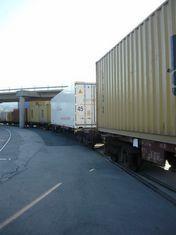
Israeli exporter Agrexco has launched a new ‘Agro train’ from Israel into Europe as it looks to reduce traffic, transport costs and emissions.
The innovative joint venture with Zim Integrated Shipping Services will be the first of its kind between Israel and the EU and is expected to take hundreds of lorries off the roads each month and significantly boost agricultural exports from the country.
The goal is to minimise freight traffic on the highways in Israel and Europe, cause less harm to the environment, lower transport costs and increase the proceeds for the farmers in Israel.
The agricultural produce will be loaded at Agrexco's specialised terminal at Ein Yahav, while strictly maintaining optimal humidity and refrigeration conditions in the containers to preserve the harvested freshness of the produce throughout the week-long journey until it reaches the consumer market.
Preserving the cooling chain from the moment the produce is harvested until it reaches the shelves overseas is the key to the success of this venture.
The agricultural train will leave Nahal Tzin in the Arava in the south of Israel and travel direct to Haifa or Ashdod seaports, where the containers will be loaded from the train onto Zim vessels and make the marine voyage to the port of Trieste in Italy.
From the Italian port, the containers will be loaded onto a 22-car train and depart for their final destination in the Netherlands, which will be Agrexco's central warehouse in Europe.
The produce will be transported in larger-than-standard 45-foot long containers which have the same carrying capacity as a lorry and are unique in that they use an electric motor during the marine voyage and then shift to the diesel motor during train transport.
Chani Danzinger, project manager at Agrexco, said: “I went to Europe in search of more efficient transport solutions. After all, we have to be innovative and adapt ourselves to the changing reality. Today, there is a burgeoning 'green' trend which calls for creative solutions to encourage environmental protection and to save the planet as well as, obviously, lowering transport costs.
“Not only that, but super-highways can no longer be built in Europe and ways are being sought to get the trucks off the highways. With these trends in mind, we found a meeting ground to satisfy each party's needs and managed to kick start the project with excellent co-operation between us.”
The move is in response to plans to charge extra toll fees for trucks traveling on super-highways per kilometre between countries in Europe from 2015.



